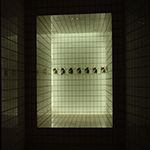Euroacademia Conferences
 Europe Inside-Out: Europe and Europeanness Exposed to Plural Observers (9th Edition) April 24 - 25, 2020
Europe Inside-Out: Europe and Europeanness Exposed to Plural Observers (9th Edition) April 24 - 25, 2020 Identities and Identifications: Politicized Uses of Collective Identities (9th Edition) June 12 - 13, 2020
Identities and Identifications: Politicized Uses of Collective Identities (9th Edition) June 12 - 13, 2020 8th Forum of Critical Studies: Asking Big Questions Again January 24 - 25, 2020
8th Forum of Critical Studies: Asking Big Questions Again January 24 - 25, 2020 Re-Inventing Eastern Europe (7th Edition) December 13 - 14, 2019
Re-Inventing Eastern Europe (7th Edition) December 13 - 14, 2019 The European Union and the Politicization of Europe (8th Edition) October 25 - 26, 2019
The European Union and the Politicization of Europe (8th Edition) October 25 - 26, 2019 Identities and Identifications: Politicized Uses of Collective Identities (8th Edition) June 28 - 29, 2019
Identities and Identifications: Politicized Uses of Collective Identities (8th Edition) June 28 - 29, 2019 The European Union and the Politicization of Europe (7th Edition) January 25 - 26, 2019
The European Union and the Politicization of Europe (7th Edition) January 25 - 26, 2019 7th Forum of Critical Studies: Asking Big Questions Again November 23 - 24, 2018
7th Forum of Critical Studies: Asking Big Questions Again November 23 - 24, 2018 Europe Inside-Out: Europe and Europeanness Exposed to Plural Observers (8th Edition) September 28 - 30, 2018
Europe Inside-Out: Europe and Europeanness Exposed to Plural Observers (8th Edition) September 28 - 30, 2018 Identities and Identifications: Politicized Uses of Collective Identities (7th Edition) June 14 - 15, 2018
Identities and Identifications: Politicized Uses of Collective Identities (7th Edition) June 14 - 15, 2018
It Walks Like a State and Talks Like a State But It’s Not a State: A Contribution to European Political Order Theory
-
-

-
Presentation speakers
- Marie-Ève Bélanger, Center for Comparative and International Studies, ETH Zurich
Abstract:
Since the 1950’s, the EU has been analyzed without a formal definition. The use of international and comparative political theories in European integration studies has allowed the analysis to reach its present level. Yet, important questions regarding EU’s political system remain unanswered. This seems to point out this strategy has reached its limits. To create knowledge about EU’s nature, and not only about its functioning mechanisms, one must address the question of the origin of the European system: What is European’s political order’s structural foundation? This research addresses the issue of creating a comprehensive theory of EU’s territorial order construction. In its political space creation process, the EU repeatedly conducts peaceful border changes; this is a unique phenomenon in the Westphalian system’s history. In an effort to determine the underlying conditions for the construction of a supranational shared political space, I am tackling the question: What do Europeans say about their community when they talk about the enlargement? Using a discourse analysis framework I have designed from the study of the Schuman Declaration, I am analyzing over 70 political and legal discourses surrounding each of EU’s enlargements. Two sets of findings are most promising:
a. Each new member-state is always included within the European discursive space before effectively becoming part of the EU. This indicates how this space is constructed: through a European intersubjective performance. The EU is always larger in the discourse than within its transitional borders;
b. A pattern of how Europeans discursively construct their political space is emerging: when talking about the enlargement, Europeans always refer to the origins, the future, the space and the meaning of the community. In the European discourse, the community emerges from reconciliation (origin) and goes towards political integration (future); it needs to stay open (space) in order to preserve peace on the continent (meaning).This pattern structures how order – the configuration between legality and legitimacy – is constructed in the EU. It is this specific order construction process that will be explored here.
-
Related Presentations

Tracing the Gender Gap in Public Support for European Membership
- Gitta Glüpker-Kesebir

The EU’s Profile in Northeast Asia
- David Hallinan

National Accounts Versus Business Accounting: Form and Content
- Nicoleta Andreea Savu















